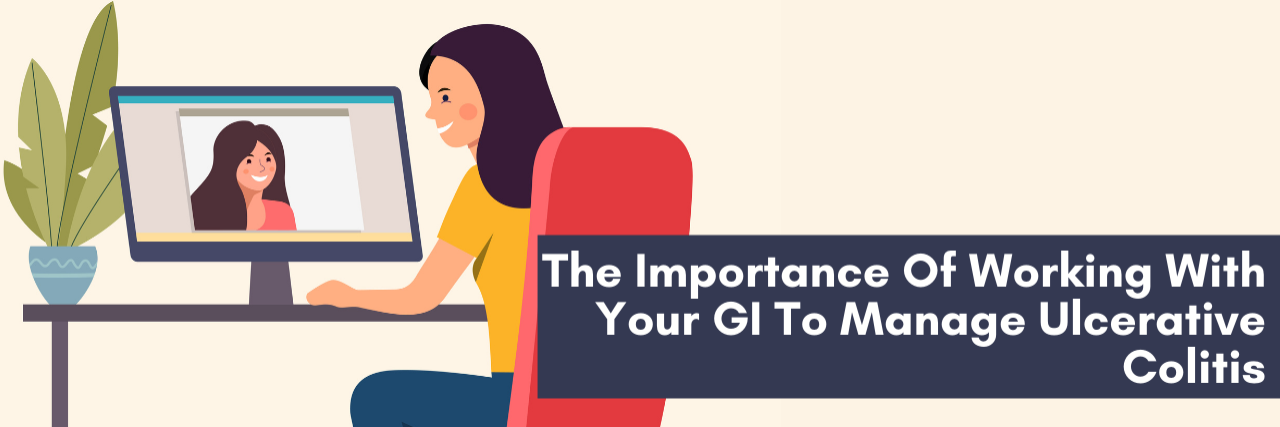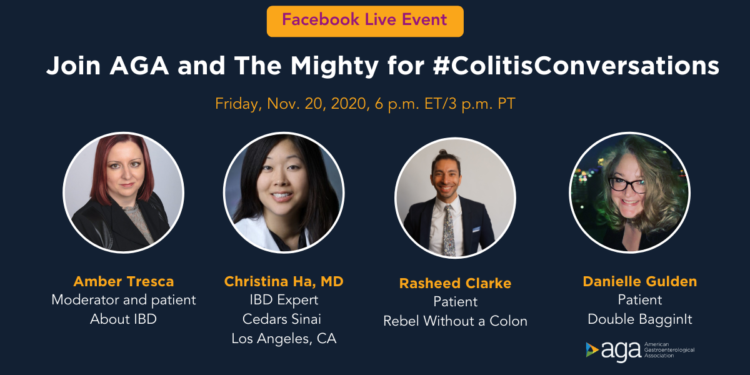During my interview with Dr. Rajeev Jain, MD, he said, “Stool is cool.” As a person living with ulcerative colitis (UC), I not only laughed out loud, but I also felt comforted that a gastroenterologist (GI) created his own way to normalize the conversation about inflammatory bowel disease. Dr. Jain is a partner at Texas Digestive Disease Consultants, as well as the Chief of Gastroenterology at Texas Health Dallas. He sits on the board of directors for the American Board of Internal Medicine and serves as the Patient Medical Education Advisor for the American Gastroenterological Association. Basically, the doctor knows his stuff when it comes to supporting people living with UC and encouraging a healthy rapport with his patients.
UC is a type of inflammatory bowel disease (IBD) that causes irritation, inflammation and ulcers in the large intestine. It is a chronic condition, which currently has no cure outside of removing part or all of the colon. I caught up with Dr. Jain to talk about how doctors can work more closely with patients, and vice versa, when it comes to treating diseases like UC. As a patient myself, it’s important to me to have a GI who cares about my quality of life as much as treating my UC. Dr. Jain is my type of GI; he truly cares for his patients, and it shows in our conversation. Here’s what he had to say about…
…that scary first appointment.
My first thing I want to know is, What were your symptoms at the time you were diagnosed? How long did you have those problems before you were diagnosed? One person was having rectal bleeding for almost a year and a half before he went to a gastroenterologist and got a colonoscopy, which showed proctitis. The majority of our IBD patients are young, so I’m sure, at first, he was told it’s hemorrhoids or something like that. So, I also want to know, What were your other manifestations? Were you losing weight? Did you have a fever? Did you have extra-intestinal manifestations of colitis, such as mouth ulcers or joint pain? Things like that. What did they see on the colonoscopy? What was the disease activity? I need to have the records so that I can objectively see what was seen.
For an established patient that’s now moving their care to me, I want to have all those data points and history from the patient in their own words, not just from what I read in the records. In that person’s case, for example, he was only taking his medicines when he would have more symptoms. And he was surprised when I told him that he had a chronic medical condition. I pulled up a picture of the colon and I showed him what the initial disease distribution was and what was on the second scope. His eyes were like, So I’ve got a chronic medical condition. This guy was diagnosed six years ago!
…addressing the biggest fears of people living with UC.
With any chronic medical condition young folks are diagnosed with, it’s a sense of loss of control. Nobody deserves to be sick at any age, but especially when you’re young, right? You’re going to college, doing all these other different things; you shouldn’t have to worry about this kind of stuff. I think patients are concerned about, first, I have a chronic problem. Second, Am I going to have to take medicine all the time? Third, Is this medicine going to give me side effects? Fourth, and a reality in America, Is this going to cost me a lot of money? Fifth, I’m going to miss work or miss time with my family and my friends. And I think the biggest concern is related to long-term issues. Am I going to need a colon resection? Will I need to get a colostomy bag? Am I going to get colon cancer? Is this going to shorten my life?
…discussing things outside of general disease management.
Reproductive health is an important issue to address, particularly for women who are diagnosed in their younger reproductive years. The voluntary childless rate in women with IBD is several fold higher than the average population. Most of the time, it’s because they’re worried about passing it on to their child, or flaring during pregnancy. Like with this appointment I’ve been talking about, I spent most of the time just making sure the patient understood what the diagnosis was. If I had two hours, I could have gone through a lot more stuff. But unfortunately, in our modern healthcare system, I was trying to make sure I was getting the most important information at that moment, in my mind, to the patient. Part of the thing is, we’re not trained for this stuff. So much of our training is spent scoping and understanding the pathophysiology of these diseases, we don’t have that sort of holistic approach to making sure we address all of these issues, a lot of which lie outside of the disease itself.
…advocating for yourself in the GI’s office.
It’s very important. I joke around with my family and say, “Who cares about me and you? Me and you.” I feel that an educated patient is going to get a lot better care because they’re going to ask the important questions. I know I’m imperfect, because I’m human, and so I might miss something. If the patient points out a potential complication, or if they aren’t understanding the data, and they say something, we can have that conversation. I would much rather have that conversation with the patient and find the best approach for them, because they’re also invested in their own disease. There are a lot of great places that have wonderful patient-facing websites, as well as social influencers that have podcasts and blog sites with their experiences. You have to be careful that you’re going to reputable sites. It’s a lot harder to unteach something that’s wrong.
…earning the trust of the people he treats.
I would say my ideal encounter would be both of us in the room, feeling at ease. They trust me, I trust them. I want the patient to be able to be completely honest with me about fears, concerns, or if they think I’m a doofus. Tell me! The visit can only be good if I’m listening and hearing them properly. But also if they’re doing the same to me, right? We’ve seen these studies where they’ll have a patient-doctor interaction occur, and then they interview the patient and doctor separately after. You’d be amazed at how disconnected the views are; one thinks they explained things clearly, but the other says they didn’t address it at all. I want the patient to be happy with me and tell me if they disagree with what I’m saying or are having negative views of what I’m suggesting. But I have to earn their trust. I don’t expect to walk in there with a blank slate and expect them to trust me just because I’m a doctor. I need to have that interaction and build that rapport with them.
…optimizing a 30-minute appointment.
You might notice that we spend a lot of time just extracting information, right? When the patient has thought about their symptoms and jots down patterns or symptoms ahead of time, that helps a lot with data extraction. There are cool symptom trackers out there you can use. Or keep a summary of every scope, biopsy, different medical therapies and when you stopped and started them. What was the result? Why did you stop? That level of detail keeps me from spending the majority of the visit asking for this information; now we can just catch up during the appointment. All my visits are 30 minutes, so if questions are prepared ahead of time, we can address that one thing you came to see me for that day.
…why “stool is cool.”
I say, “We’re not at the dining table right now. It’s me and you.” My wife is an infectious disease doctor, so she takes care of HIV and now COVID all the time. It doesn’t even faze her to ask, “Do you have sex with men? Women? Both? Do you have an STD?” It’s not a judgmental thing; it’s just a question to help. It’s the same thing with UC. I try to use a little bit of levity, if I think it’s appropriate. One line is “stool is cool.” But if I don’t feel it’s appropriate, I won’t. Regardless, I want patients to be comfortable telling me, “I get some fecal leakage every now and then.” Because that’s important to know. That’s a really important part of the quality of life for the patient. I want to adjust things to help minimize those types of symptoms for them.
…questions he wants people living with UC to ask their GI.
I wish they would ask me, a very open-ended question: What can I do for myself? What can I do to support myself? Because the patient is the one who has the most skin in the game, right? They’re the ones living with UC on all these different levels, right? Financial, emotional, physical–you name it. That’s not to say the onus is completely on you, but if it’s not getting across to me that this is your biggest concern, and I’m over here focusing on something else, you need to reel me in. The other thing I would say is, I want patients to ask me about the most important thing to them, whatever that may be. I hope that I make them feel comfortable enough to do that.
…creating hope with newly diagnosed people.
First, I’d say the vast majority of patients do well with UC, and we can control the symptoms to give them a good quality of life. I’m not minimizing the struggles that so many of our patients go through, but the majority of my patients do well. So I like to, not falsely but realistically, reassure the patient that, for the most part, we can make you feel good in life. When I started practicing in 1999, the data showed a much higher risk of colon cancer. However, that data was skewed because it was from tertiary referral centers that saw the sickest of the sick. When they did a wider view of the true patient population, that lifetime risk, although still higher than the general population, dropped substantially. That doesn’t mean we blow anything off, but I like to tell them that we can control this and they are not destined for colon cancer, if we take good care of you. Now, that doesn’t mean it’s a guarantee; this disease has a vast spectrum. But for the overwhelming majority of patients with UC, they do well.
Note: This interview was edited for clarity and length.
Learn more here.



